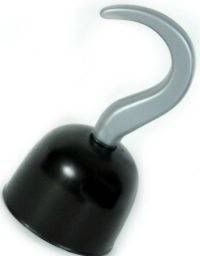What's Your Hook?

I recently received a rejection letter from an editor—my second—and have consequently been ruminating on rejection lately. (Anyone who hasn’t read Deidre Knight’s recent column on this topic over at Romancing the Blog should definitely check it out.) Both editors have given very positive feedback, saying that the heroine’s voice was engaging, and they liked the rest of the characters as well. The problem, according to these editors, is that my novel lacks a hook and I can understand why, in this extremely competitive genre, they’re looking for something with an obvious and immediate attention-getter.
I mean, I would love. . .love to see my first novel published. I adore the characters I created, I think the plot is solid and there is a lot in those pages that I hate to think might never see the light of day. But honestly, when I finished that project, I’d been working on it for over two years. I know that literature doesn’t exist in a vacuum. The chick lit genre is a different place today than it was when I wrote the first chapter and ironed out the plot.
Anyone who is keeping up with women’s fiction in general, and chick lit in particular, knows that the playing field is massively crowded at the moment. The only thing getting published lately are books that have a clear hook—i.e., vampire chick lit, or reality show chick lit or fat girl chick lit. To be honest, part of the reason it took me so long to finish the project in question was that I wasn’t sure exactly what distinguished my novel from the others out there. Jemima J is the one where the heroine loses, like, a million pounds in three months, In Her Shoes is the one with the psychotic sister who ruins the boring sister’s shoes all the time—how would readers describe my book? In the end, it required a rewrite and the sacrifice of several scenes that I adored for me to figure out why my work was different and special. Now I’m confident that, if it ever gets into the readers hands, it will stick in their memories as the book where. . .well, I’m not going to give away the ending, but let’s just say it’s got a unique set of conflicts and resolutions.
That second rejection letter, couched in the friendliest and most positive of terms, made me briefly revisit my insecurities about my work, but once that passed it made me wonder what we’re missing now due to the industry’s insistence that every book they publish have a gimmick. Really, that’s what it boils down to—a creative title and interesting blurb is no longer enough. Chick lit now needs an obvious hook, something that will make readers sit up and take notice. Frankly, however, a fantabulous hook is no promise of an equally fantabulous story. I can think of several books that I’ve picked up recently because of a unique gimmick (I admit it, I’m a sucker for a concept book) that were just. . .disappointing. Not a bad read, but not a classic either.
I’m not opposed to writing concept chick lit. On the contrary, my current project is so conceptual that my character-loving muse engaged in a balancing act worthy of the Flying Wallendas in an effort to keep the concept at the core of the story without sacrificing character development. Over the Christmas holidays, I started sketching out an outline for yet another project, one that will most certainly be described one day as “that book where the heroine _______.” But as I sit here remembering some of my favorite women’s fiction, I realize that it’s not the gimmick that holds me, or the snappy titles or even the gorgeous covers. It’s characters I believe in and wish I could go to lunch with; it’s a vivid setting that means I don’t just know the book is set in London because the heroine refers to the transit system as “the tube” instead of “the metro;” it’s conflict that I see reflected in my life and the lives of my real-life friends. I hope that, when the over-saturation of the chick lit marketplace has subsided a bit, there will still be room for a thousand flowers to bloom because that, after all, is what draws me to those strategically-placed tables at Borders every time I cross the threshold of the mall.
